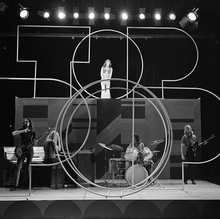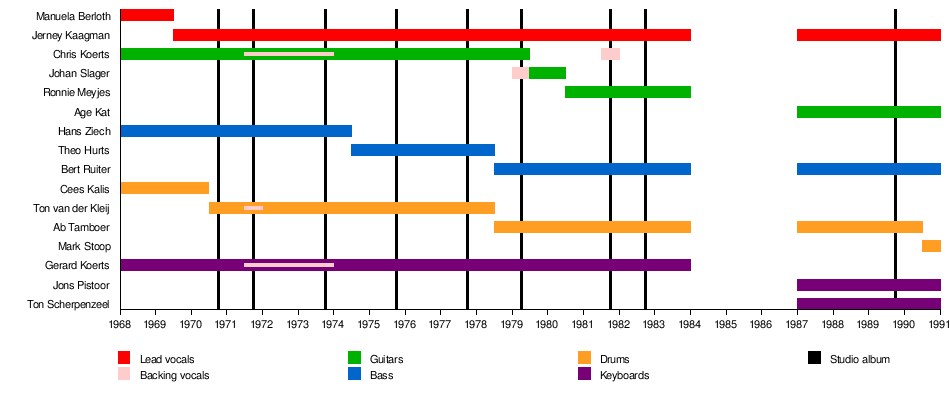This article has multiple issues. Please help improve it or discuss these issues on the talk page. (Learn how and when to remove these messages)
|
Earth and Fire[1] were a Dutch rock and pop band. Formed in the Netherlands by twin brothers Chris and Gerard Koerts, and most popular in 1970, after adding a female singer, turning frontwoman, Jerney Kaagman.[citation needed]
Earth and Fire | |
|---|---|
 Earth and Fire in 1971 | |
| Background information | |
| Origin | Netherlands |
| Genres | |
| Years active | 1968–1983, 1987–1990 |
| Past members | Gerard Koerts Chris Koerts Hans Ziech Cees Kalis Manuela Berloth Jerney Kaagman Ton van der Kleij Theo Hurts Bert Ruiter Ab Tamboer Johan Slager Ronnie Meyjes Age Kat Jons Pistoor Ton Scherpenzeel Mark Stoop |
Earth and Fire's first eight singles were a practically uninterrupted string of top-5 hits in the Netherlands (1970-1974). Also charting in continental Europe, primarily in neighboring Belgium and Germany, the band never gained much popularity in the United Kingdom or the United States. After moving to pop, their biggest hit was "Weekend" (1979), a number one disco track in the Netherlands, Denmark, Germany, Portugal, and Switzerland. American copies were labeled as E & F [Polydor 2118].[citation needed]
History
editEarly history: The Singing Twins and The Swinging Strings
editEarth and Fire originated with the brothers Chris and Gerard Koerts from Voorschoten. As "The Singing Twins" they made music for family and friends since 1960, achieving a breakthrough of sorts at a talent show in 1962, at which future bass player Hans Ziech was present—Ziech, at the time, was already interested in rock and roll and thought The Singing Twins a bit on the mild side, Jan & Kjeld-like. In 1963, influenced by beat music, they joined a local beat band, playing mostly instrumental music until early 1965; the Koerts brothers were remembered as musical perfectionists even at an early age. They changed their name to The Swinging Strings in 1965 and began singing and covering hits by the Beatles, the Byrds, and others. They played regularly and saved enough money to buy equipment and add three female dancers. While they played all over the provinces of North and South Holland, they rarely performed in their area as The Hague had its scene of beat bands.[2] By the end of 1966, however, they had won a few talent shows near their hometown, had a fan club with over 250 members, and had drawn the attention of radio DJ Willem van Kooten.[3]
Opus Gainfull, transition to Earth and Fire
editBy 1967 the Koerts brothers were dissatisfied with playing cover music and were looking to increase the technical level of their music. Somewhat abruptly, according to the other members, they broke up the Strings and renamed the band Opus Gainfull, and were looking for a rhythm section. They found a bass player in Hans Ziech (born 1943) of the local band The Soul, and also picked up that band's drummer, Cees Kalis. The Soul's guitar player, Eric Wenink, also joined, for a couple of years. Throughout 1968 and 1969 the band practiced new music while listening to the music of Jimi Hendrix, Moby Grape, Jefferson Airplane. The decision was made to look for a singer, and Manuela Berloth joined them.[citation needed]
Meanwhile, their music continued to evolve, with ideas for concept albums brought in from the US West Coast and improvisational practice sessions. In 1968, before a show in Beverwijk, the band's name was changed to Earth and Fire. The band recorded two songs as the prize for winning a talent show in 1969, but were not offered a record contract; by the end of the year, Berloth, who in Gerard Koerts' words "was not a rock 'n roll woman", left. The Koerts brothers, who were graduating from school at the time, took over on vocals, and the band continued touring, opening for established beat band Golden Earring. In September 1969, they met and hired Jerney Kaagman.[4]
The band's first album, Earth and Fire (1970), produced three hits: "Seasons" reached no. 2 on the Dutch charts, with an estimated 60,000 copies sold; the second single, "Ruby Is the One" (later covered by the Claw Boys Claw for Hitkillers) reached no. 4 and sold 40,000 copies.[5]
By 1977, after four albums and nine hits, particularly songs such as "Memories" (which became their first number one single, and was named song of the year in Israel) and "Maybe Tomorrow, Maybe Tonight", the band found the Dutch musical atmosphere had changed considerably: new bands, influenced by disco, punk, and new wave, threatened to render many of the previously popular Dutch groups obsolete. They therefore moved away from the heavier pop sound they had been making and moved to a more mainstream style, focusing on Disco. 1977's Gate to Infinity suffered a cool reception and the album's lead single, "78th Avenue", failed to break into the Dutch top 10. Drummer Ton van der Kleij left in August 1978, followed shortly thereafter by bass player Theo Hurts. Despite rumors that Kaagman would go solo or take a job at TopPop (the leading pop-music TV-show in Holland and Flanders), she stayed with the Koerts brothers, who quickly found another drummer, Ab Tamboer, and another bass player, Bert Ruiter (Kaagman's partner in life and formerly with Focus). In 1979 they achieved their second number one single "Weekend", but soon afterwards, Chris Koerts left, feeling that he had achieved everything he wanted with the band.[6]
The band split in 1983, with Kaagman moving onto a solo career, before a short lived reunion in 1987. Later, Kaagman became a judge on the very successful Dutch "Idols" adaptation of the Idols franchise. Ton van der Kleij died in 2015.[citation needed] Gerard Koerts died in 2019.[7] Bert Ruiter and Chris Koerts[8] died in 2022.[citation needed]
Personnel
editMembers[citation needed]
edit
|
|
Timeline
edit
Discography
editAlbums[citation needed]
edit- Earth and Fire (1970)
- Song of the Marching Children (1971)
- Atlantis (1973)
- To the World of the Future (1975)
- Rock Sensation (1975 COMPILATION)
- Gate to Infinity (1977)
- Reality Fills Fantasy (1979)
- Andromeda Girl (1981)
- In a State of Flux (1982)
- Phoenix (1989)
- Greatest Hits (CD) (1991)
- Wild And Exciting (1999 compilation)
- The Ultimate Collection (3CD) (2003)[10]
Singles
edit| Year | Single | Chart positions | Album | ||
|---|---|---|---|---|---|
| NL [11] |
BEL (Vl) [12] |
GER | |||
| 1969 | "Seasons" | 2 | 4 | — | Earth and Fire |
| 1970 | "Ruby Is the One" | 5 | 11 | — | |
| "Wild and Exciting" | 5 | 21 | — | ||
| 1971 | "Invitation" | 4 | — | — | non-album single |
| "Storm and Thunder" | 6 | — | — | Song of the Marching Children | |
| 1972 | "Memories" | 1 | 2 | 31 | non-album single |
| 1973 | "Maybe Tomorrow, Maybe Tonight" | 3 | 9 | 44 | Atlantis |
| 1974 | "Love of Life" | 2 | 20 | — | To the World of the Future |
| 1975 | "Only Time Will Tell" | 16 | — | — | |
| "Thanks for the Love" | 9 | 28 | — | non-album single | |
| 1976 | "What Difference Does It Make" | 10 | — | — | |
| 1977 | "78th Avenue" | 14 | — | — | Gate to Infinity |
| 1979 | "Weekend" | 1 | 1 | 1 | Reality Fills Fantasy |
| 1980 | "Fire of Love" | 20 | 13 | 29 | |
| 1981 | "Dream" | 19 | 20 | — | Andromeda Girl |
| "Tell Me Why" | 37 | — | — | ||
| 1982 | "Love Is an Ocean" | — | — | — | |
| "Twenty Four Hours" | 15 | 23 | 72 | In a State of Flux | |
| 1983 | "Jack Is Back" | 42 | — | — | |
| "The Two of Us" | 32 | — | — | ||
| 1989 | "French Word for Love" | 44 | — | — | Phoenix |
| 1990 | "Keep on Missing You" | — | — | — | |
| "Good Enough" | — | — | — | ||
References
edit- ^ Earth and Fire adopted their name about a year before Earth, Wind & Fire.
- ^ Hermsen and Hermsen, 6-8.
- ^ Hermsen and Hermsen, 9, 11.
- ^ Hermsen and Hermsen, 14-17.
- ^ Hermsen and Hermsen, 26.
- ^ Hermsen and Hermsen, 4-6.
- ^ "DPG Media Privacy Gate". myprivacy.dpgmedia.nl. Retrieved 5 November 2024.
- ^ "RIP Chris Koerts -". 11 November 2022. Retrieved 5 November 2024.
- ^ "Den Haag FM » Haagse drummer Ab Tamboer (Earth and Fire) overleden". Denhaagfm.nl. 24 January 2013. Retrieved 29 August 2016.
- ^ "Earth and Fire - De biografie 1969-1983". Eburon.nl. 9 November 2006. Archived from the original on 29 June 2009. Retrieved 29 August 2016.
- ^ "Single Top 100".
- ^ "Ultratop Belgian Charts". Ultratop.be. Retrieved 29 August 2016.
Bibliography
edit- Hermsen, Fred; Hermsen, Dick (2006). Earth and Fire: de biografie, 1969-1983. Eburon. ISBN 9789059721289.
External links
edit- Earth and Fire discography at Discogs
- Earth and Fire at IMDb